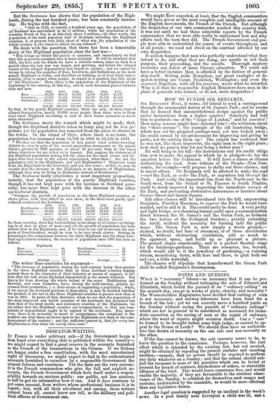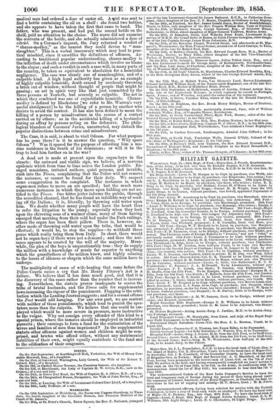NOTES AND QUERIES.
WHAT is " necessary" labour-so necessary that it can be per- formed on the Sunday without infringing the acts of Edward and Elizabeth, which forbid the pursuit of an "ordinary calling" on the seventh day, except in works of piety, charity, and necessity ? The Worcestershire Magistrates have decided that cutting of corn is not necessary, and railway labourers have been fined for a breach of the law ; yet we can scarcely move a hundred yards on the Sunday without seeing the pursuit of "ordinary callings" which are not in general to be considered so necessary for imme- diate execution as the saving of corn or the repair of railways, where the want of repairs might occasion death. Can a "ease" be framed to be brought before some high judge, or carried by ap- peal to the House of Lords ? We should then have an authorita- tive line drawn of necessity on the one side and non-necessity on the other.
If the line cannot be drawn, the sole resource seems to be, to leave the question to the conscience. Perhaps, however, the just effect which is intended by the existing law, but not secured, might be obtained by repealing the present statutes and enacting another -namely, that no person should be required to perform any duty whatever on a Sunday; and that the refusal should sub- ject the recusant to none of the penalties which can be levied at present for breach of contract, disobedience of orders, or statntable offences of the kind. This would leave conscience free, and would enable the majority, if they are favourable to the strictest obser- vance of the Sunday, to establish for themselves such usages and customs, undisturbed by the constable, as would be more effectual than any legislative decree. Another legal question is suggested by an incident in the week's news. In a poor family near Liverpool a child was ill, and a
medical man had ordered a dose of castor oil. Algid was sent to find a bottle containing the oil on a shelf : she found two bottles, and she appears to have taken the first that came to hand. The father, who was present, and had pat the second bottle on the shelf, paid no attention to the choice. The nurse did not examine the contents of the bottle, and she actually administered a dose of vitriol. On a Coroner's inquest, the Jury returned a verdict of "chance-medley," as the nearest they could devise to "man- slaughter." This is a verbal inaccuracy which may lead to prac- tical mischief, since it unsettles the definitions of offences. Ac- cording to traditional popular understanding, chance-medley is the infliction of death under circumstances which involve no blame to the slayer; and such a verdict in such a ease will, in many parts of the country, be taken as equivalent to absolution for a homicidal negligence. The ease was clearly one of manslaughter, and of a culpable kind. A high legal authority has given as an example of highly culpable homicide, death caused by carelessly throwing a brick out of window, without thought of people that might be passing; an act in spirit very like that just committed by the three persons at Tozteth, but scarcely so culpable. The act in which they combined was one of unjustifiable homicide. Chance- medley is defined by Blackstone we refer to Mr. Warren's very useful abridgment] to be the killing of a person by another who desires to avoid the contest. It has also been defined to mean the killin& of a person by misadventure in the course of a contest carried on by others ; as in the accidental killing of a bystander during an affray by persons acting on the defensive. The philo- logical blunders of Coroners' Juries, uncorrected, may disturb the popular distinctions between crime and misadventure.
The Czar, it is said, is about to visit Odessa. For what purpose has he gone there ? is it to answer the question, "Why spare Odessa" ? Was it spared for the purpose of affording him a ma- rine residence in the South of his dominions; or will it be the trap to lead him further on in the war?
A dead set is made at present upon the organ-boys in the streets : the outward and visible sign, we believe, of a nervous epidemic which from time to time seizes the London public. En- raged musicians, irritated authors, quiet persons, and invalids, rush into the Dines, complaining that the Police will not remove the nuisance, or cannot be found for their duty. We suspect some exaggeration in the complaint. The instances in which organ-men refuse to move on are specified; but the much more numerous instances in which they move upon bidding are not no- tified to the Times. One bitter jester informs the public, through the accredited channel, that he has found an infallible way of send- ing off the Italian ; it is, literally, by throwing cold water upon him. We doubt whether many people will have the heart thus to refer the litigation to the pump; especially when they look upon the shivering sons of a warmer clime, many of them having emerged that morning from their cold bed under the Park railings, where the organ has been their pillow. There is, however, an- other mode of throwing cold water upon the tribe, that would be effectual; it would be, to stop the supplies—to withhold those pence which really bring them from Italy. In short, there would not be organ-boys if there were not a demand ; and thus the nui- sance appears to be created by the will of the majority. Mean- while, the plea of the boys is unquestionably true : they do supply the million with a knowledge of music far superior to anything which the grandfathers of the million knew, and highly solacing to the hours of idleness or chagrin which the same million have to undergo.
The multiplicity of cases of wife-beating that come before the Police Courts raises a crx that Mr. Henry Fitzroy's Act is a failure. We believe that it has done much good, and that it is the discovery of the cases rather than the number that is increas- ing. Nevertheless, the statute proves inadequate to coerce the tribe of brutal husbands, and the Times calls for supplemental laws increasing the rigour of the punishment. Flogging is the retri- bution which the Leading Journal suggests ; and for a second offence the Poet would add hanging. For our own part, we are content with neither of these punishments, which tend to punish the spec- tators more than the culprits. We believe that one could be em- ployed which would be more severe in pressure, more instructive to the vulgar. -Why not °ensign every offender of this kind to a special prison, where the inmates should be employed in industrial pursuits ; their earnings to form a fund for the sustentation of the wives and families of men thus imprisoned? In the supplemental statute other offences against women and children might be com- prised, and brutes who offend either, without any matrimonial liabilities of their own, might equally contribute to the fund and to the edification of their congeners.



































 Previous page
Previous page